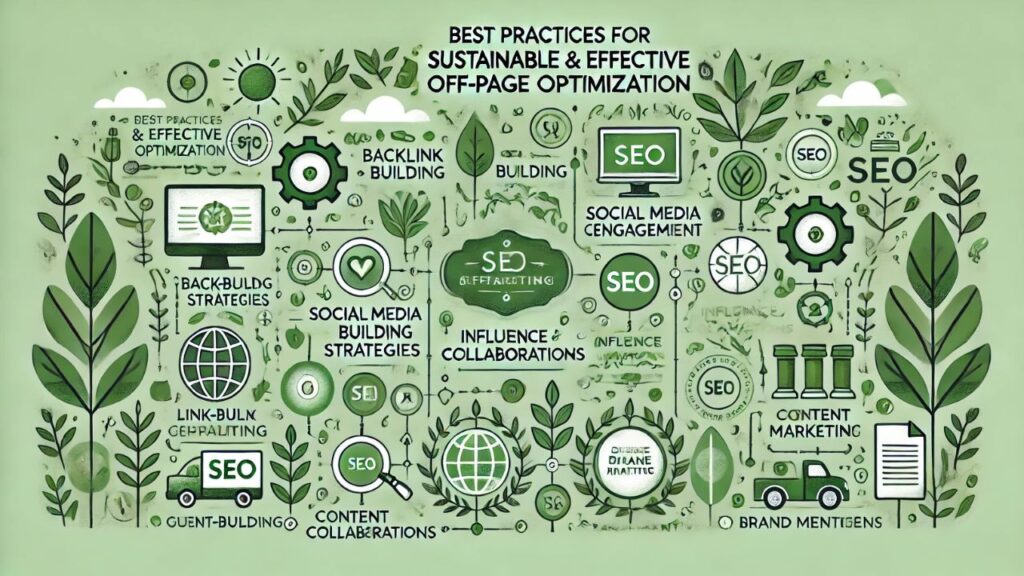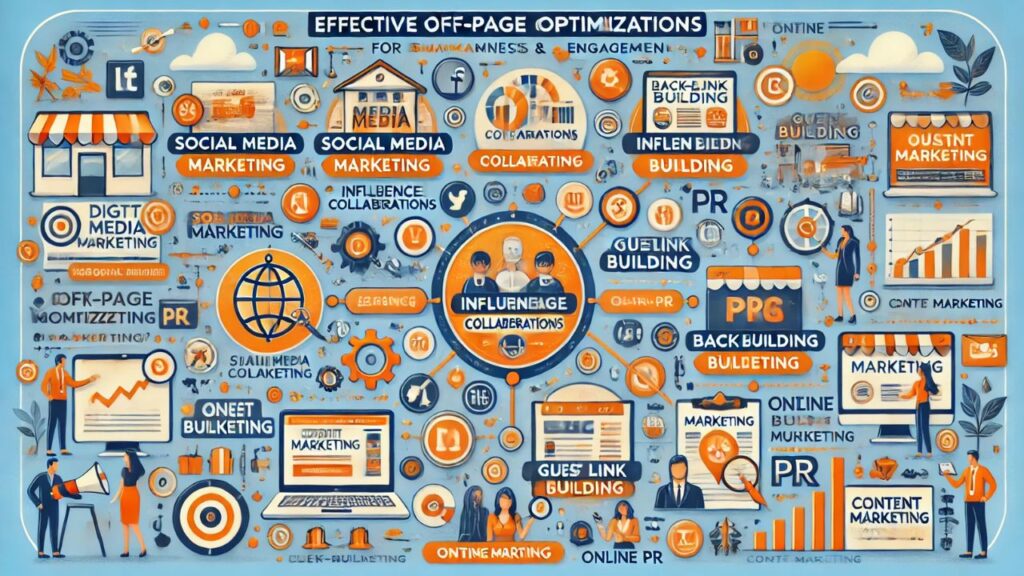Effective Off-page optimization is a key pillar of any comprehensive digital marketing strategy. While on-page techniques focus on refining a website’s internal structure, off-page optimization extends beyond the boundaries of a site, helping to build brand authority, increase visibility, and drive meaningful engagement. In a competitive online world, focusing on off-page efforts becomes essential for strengthening brand awareness and cultivating long-term connections with audiences.
Understanding the dynamics of off-page optimization and how it contributes to brand visibility and engagement can help businesses structure more effective marketing plans. This article delves into the core components of off-page optimization and explores how these practices influence brand awareness and audience interaction.
Table of Contents
What is Off-Page Optimization?
Off-page optimization refers to all activities performed outside of a website to improve its rankings in search engine results pages (SERPs). These strategies aim to enhance a site’s reputation, authority, and relevance through external signals. Unlike on-page optimization, which deals with content and site structure, off-page optimization relies on factors such as backlinks, social signals, and external content.
For brand awareness and engagement, off-page strategies are crucial. They help build trust, reach new audiences, and encourage consistent interactions with a brand across multiple platforms. When executed well, off-page optimization not only improves search rankings but also amplifies a brand’s presence across the digital ecosystem.
The Role of Effective Off-Page Optimization in Brand Awareness
Brand awareness depends heavily on how visible a business is outside its owned channels. Effective Off-page optimization extends a brand’s reach by creating opportunities for discovery through external sources. By appearing on reputable sites, engaging across social networks, and building a network of backlinks, brands can ensure that their name becomes familiar to wider audiences.
Search engines take these external signals into account when evaluating a website’s relevance and authority. The more high-quality mentions and links a brand receives, the more credible it appears in the eyes of both users and search engines. This credibility leads to higher rankings, which increases the likelihood of brand discovery.
When off-page techniques are integrated into an overall digital marketing strategy, they create touchpoints that allow potential customers to interact with a brand across different stages of their journey. These touchpoints reinforce brand recognition and contribute to sustained awareness over time.
Key Off-Page Optimization Strategies for Brand Engagement
Building meaningful engagement through off-page optimization requires a combination of targeted actions. Below are the most effective methods for driving brand engagement while enhancing visibility.
Link Building
Link building remains a cornerstone of off-page SEO. Acquiring high-quality backlinks from authoritative sites signals to search engines that a website is trustworthy and relevant. However, effective link building goes beyond quantity. The focus should be on obtaining backlinks from reputable sources related to the brand’s industry.
Backlinks serve as endorsements. When credible sites link to a brand’s content, it helps build recognition and introduces the brand to new audiences. The result is increased traffic, higher search visibility, and greater opportunities for engagement.
Content Distribution
Sharing content across external platforms supports off-page optimization by extending the reach of valuable information. Articles, infographics, videos, and other assets published on third-party sites can position a brand as a thought leader while attracting interest from potential customers.
Content distribution across guest blogs, online magazines, and industry publications helps maintain a steady presence in relevant digital spaces. This ongoing visibility supports both brand awareness and audience engagement as readers interact with the content and become familiar with the brand.
Social Media Signals
Although social media activity is not a direct ranking factor, it contributes significantly to off-page optimization goals. Social platforms serve as channels for content promotion, audience engagement, and brand interaction.
Active participation on social networks helps cultivate a loyal following. Engaging posts, timely responses, and consistent activity keep a brand top-of-mind for followers. Over time, these efforts enhance brand recall and encourage deeper engagement through comments, shares, and likes.
Online Mentions
Brand mentions across blogs, forums, news sites, and other online spaces play a valuable role in off-page optimization. Even without direct backlinks, mentions contribute to brand visibility. Search engines assess these unlinked mentions as signals of a brand’s relevance and authority.
Monitoring and encouraging online mentions ensures that a brand maintains a visible and positive presence across the web. Regular engagement with communities and participation in discussions can support this goal.
Influencer Collaboration
Influencer partnerships provide access to new audiences while enhancing credibility. Working with industry figures who have established trust among their followers can amplify a brand’s message and drive targeted engagement.
Off-page optimization benefits from these collaborations, as influencers often create content that links to or mentions a brand. These external endorsements contribute to stronger search visibility and help foster connections with interested audiences.
Optimizing for Engagement Through Off-Page Activities
Beyond visibility, off-page optimization is about encouraging interactions that build relationships. Engagement goes hand-in-hand with awareness, as users are more likely to remember and trust brands that offer meaningful experiences.
Build Interactive Content
Encouraging interaction through polls, surveys, and interactive media can extend a brand’s reach and deepen engagement. Sharing this type of content on external platforms or through social media invites participation while promoting the brand.
Participate in Community Discussions
Active involvement in industry forums, Q&A sites, and online communities allows brands to engage directly with potential customers. Answering questions, providing insights, and contributing helpful information build trust and increase awareness simultaneously.
Encourage User-Generated Content
User-generated content, such as reviews, testimonials, and social media posts, provides authentic external signals that support off-page optimization. Brands that encourage and share user content benefit from increased engagement and enhanced credibility.
Measuring the Impact of Off-Page Optimization on Brand Awareness
To assess the effectiveness of off-page optimization strategies, brands can monitor several key performance indicators (KPIs):
- Backlink quality and quantity: Evaluating referring domains and link relevance.
- Referral traffic: Tracking visitors coming from external sources.
- Social engagement metrics: Monitoring shares, comments, and interactions across platforms.
- Brand mention volume: Measuring the frequency of brand references online.
- Search visibility: Observing improvements in keyword rankings.
Regular analysis of these indicators helps refine effective off-page optimization efforts to better align with brand awareness and engagement goals.
Best Practices for Sustainable Effective Off-Page Optimization

Achieving long-term success with effective off-page optimization involves strategic planning and ongoing effort. Some best practices include:
- Prioritizing quality over quantity: Focusing on credible, relevant sources for backlinks and mentions.
- Consistent content promotion: Maintaining a regular schedule of content distribution across various platforms.
- Active social presence: Engaging audiences through meaningful interactions on social networks.
- Building authentic relationships: Collaborating with influencers, industry peers, and communities.
- Monitoring brand reputation: Addressing feedback and maintaining a positive online image.
By following these best practices, brands can ensure that their effective off-page optimization efforts contribute to lasting awareness and meaningful engagement.
Conclusion
Effective Off-page optimization plays a crucial role in building brand awareness and driving engagement. By leveraging strategies such as link building, content distribution, social media interaction, and influencer collaboration, businesses can extend their reach and foster connections beyond their own websites.
As search engines continue to evaluate external signals to determine credibility and relevance, maintaining a strong off-page presence becomes essential. Through consistent, thoughtful off-page efforts, brands can establish authority, increase visibility, and encourage ongoing audience interaction.
Ultimately, effective off-page optimization is not a one-time task but an ongoing process that supports the broader goals of digital marketing. By focusing on sustainable strategies and measuring their impact, brands can create a foundation for long-term success in both search visibility and customer engagement.
Frequently Asked Questions (FAQ)
What is off-page optimization in SEO?
Off-page optimization refers to all actions taken outside of your website to improve its search engine rankings. This includes strategies like link building, social media engagement, and online brand mentions, all of which help enhance a site’s authority, relevance, and visibility.
How does off-page optimization help with brand awareness?
Off-page optimization increases brand awareness by promoting your business across external platforms. When your brand appears on reputable websites, social media, and through backlinks, it becomes more visible to wider audiences, making your brand more recognizable over time.
Why are backlinks important for off-page optimization?
Backlinks serve as a signal to search engines that other websites find your content valuable and trustworthy. High-quality backlinks from authoritative sites can improve your search rankings and drive referral traffic, both of which support greater brand visibility and engagement.



